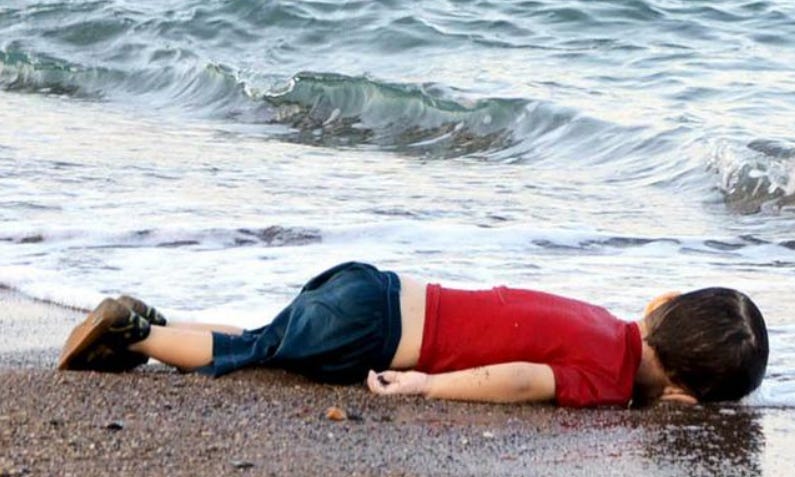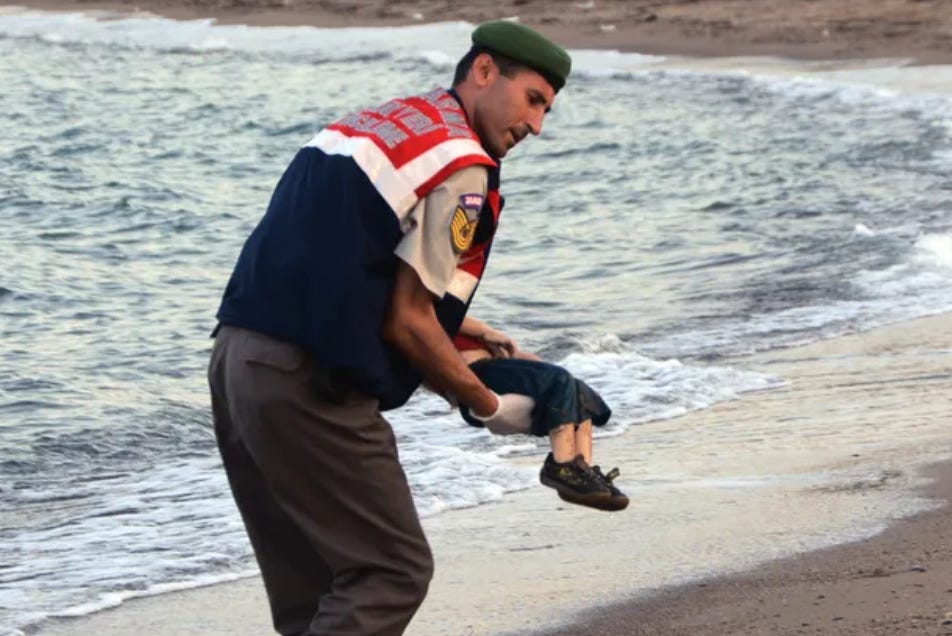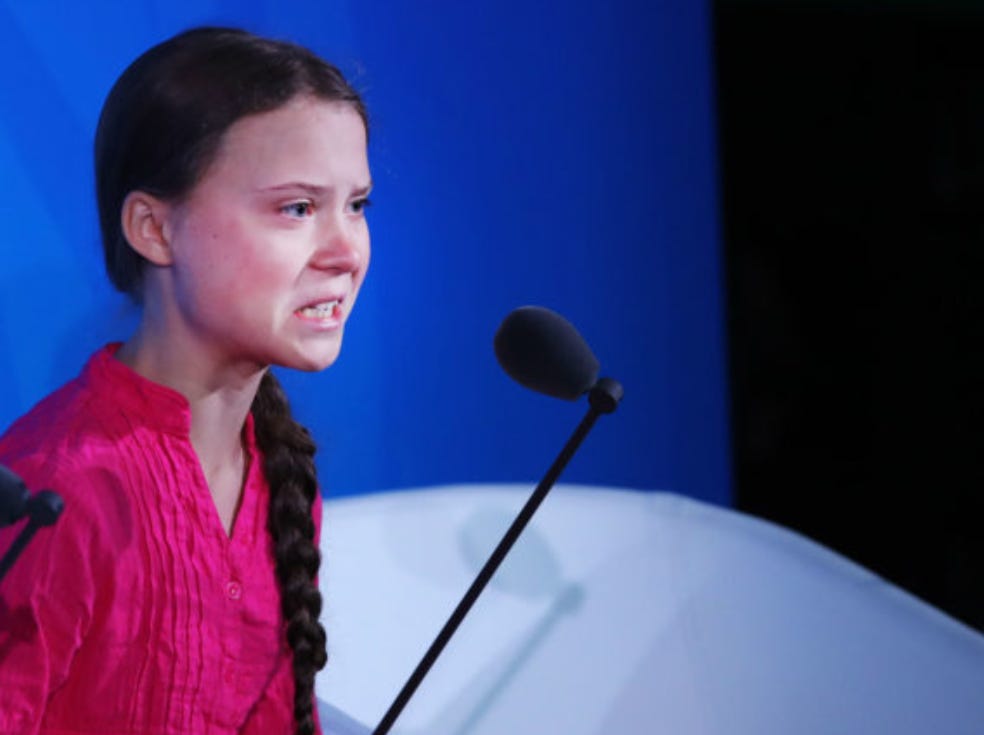The Hysterical Style in Western Politics
The Hysterical Style in Western Politics
Why the political rhetoric of Western nations is growing ever more insane and unhinged.
If one thing distinguishes present politics, it is the hysterical style. By this I mean the unceasing deployment of falsely urgent affective appeals by the press and politicians to manipulate the public attitude and mobilise support for specific programmes.
All major events according to the hysterical style unfold in much the same way: Very suddenly, it is brought to your attention that a Very Bad Thing is happening, which is somehow also Your Responsibility, and for which there is A Solution – if only we could muster the necessary Will and Determination and Faith in Democracy. Generally there can only be one such hysterical narrative at a time; for weeks or months or even years it must be at the centre of every important discussion. Above all you are called upon to feel a specific way about this Very Bad Thing and to demonstrate your feeling with some specific performative action, whether that is attending a protest or wearing a mask. Sooner or later – and whether or not anything has been accomplished against this Very Bad Thing – the hysteria subsides, making way for the next Very Bad Thing. In the hysterical style, politics are never normal; we are always on the verge of some grave catastrophe, always being called upon to emote in new ways and demonstrate this emoting in new political rituals. It is an exhausting way to live.
Media hysteria is as old as the printing press, but never before has the hysterical style so dominated Western politics. In Germany, I would trace the present era of hyper-hystericisation to the migrant crisis of 2015. The prior year had seen an upsurge in migration to Germany, and in response the rise of the populist anti-Islam movement known as Pegida. In her New Years speech on 31 December, Angela Merkel demanded more “openness to refugees,” who she said would be “a gain for all of us.” In 2015 migration rose still further, and on the last day of August Merkel again addressed the German people, demanding that Europe “share the responsibility for refugees seeking asylum” because of something called “universal civil rights,” which would be destroyed if Germany turned back the influx. It was her famous wir-schaffen-das speech.1
Forty-eight hours later, as opposition to Merkel’s open-borders paean was building, the body of a drowned two year-old Syrian Kurdish boy named Alan Shenu washed up on a beach in Bodrum, Turkey. A local photographer snapped staged photographs of the body; these images were all the media would talk about for days.
“People will soon be dying here every day as they flee to Europe,” Rüdiger Schaper wrote in a typical report for Tagesspiegel on 3 September. The photo “shakes the world,” he wrote; it is “unbearable, indelible.”
So many things flash through your mind, questions against your better judgement. You want to jump in, pick up the little one, shake him awake, look after him – that's the immediate human impulse. There is also this image: the boy is no longer lying on the beach. A policeman is holding him in his arms. You know what you already knew. The boy is no longer alive.
Schäper hoped that the image would move “even those people who can’t bring themselves to look at it.”
That’s why these images must not be suppressed. Because there is hope that they will change something in countries that show little or no willingness to take in refugees. Because it is possible that politicians will reconsider their stance and the willingness to help will increase. Because images can be a weapon in a world dominated by images.
Buried even in these earliest reports were all the crucial if inconvenient details: Shenu’s family had already fled the Syrian civil war to Turkey, where his father Abdullah had employment. Turkey, however, was not good enough; their aim was to join relatives in Canada. It is unclear whether they ever applied for Canadian asylum and in any case Turkey denied them an exit visa. Thus his father paid smugglers to bring his family on a raft to the Greek island of Kos. What happened next is unclear, because of Abdullah’s contradictory statements: He allegedly told the Turkey’s Dogan News Agency that, after two failed smuggling attempts, he set out on his own boat which sank 500 metres offshore; “we had no life vests,” he said. To Western media, he claimed that it was the smugglers’ boat that sank, and indeed they had life vests, “but they were all fake, they were useless.” The suspicious inconsistencies aside, it is hard to see how Shenu’s death had anything to do with German or even European asylum policy. If there was to be a moral panic, Turkey and its lax enforcement operations against smugglers would have been a more appropriate target; the Arab states which consistently refused to accept Syrian refugees would have been another. But details do not matter in the hysterical style of politics; it is all about images and emotions, that is the whole advantage of this approach.
Its disadvantage, is that hysteria turns out to be an ephemeral thing. Sooner or later the emotions boil off and you are left in a new and somewhat more broken world. The bloom first faded from the rose with the New Years Eve sexual assaults in Cologne, which was merely our first introduction to the rough behaviour of our new guests. In the years since, Germans have realised that refugees can be no solution to our ageing workforce; 62% of all German unemployment benefits are presently spent on migrants, the descendants of migrants, or their families. Now that we have opened our borders, though, it has proven all but impossible to close them again; merely housing and feeding the ever greater migrant waves has brought the state to its limits and beyond them.
These new stories have only partly drowned out the hystericist humanitarian drumbeat, which is still there, but in a post-acute phase – an ominous background music that is forever trying to regain the upper hand. Thus you still have Frankfurter Rundschau running guest pieces from UNO-Flüchtlingshilfe, a German refugee NGO, about how 114 million people were displaced by “war, violence, persecution and the consequences of climate change” in 2023. Now that there are already millions of refugees here, of course, there are other migrant-adjacent themes to panic about, for example the grave threat to refugees posed by Alternative für Deutschland and “the right.” Perhaps at some future date, when our memories of 2015 have subsided, one of these nascent hysterical narratives will spring to prominence yet again.
There are billions of poor and oppressed people in the developing world, and untold hundreds of millions of them would like to live in Europe. The refugees we have accepted so far have changed our own countries profoundly, but they are nothing more than a drop lifted from the vast ocean of human suffering, and to this day migrants still drown in the Mediterranean. Nevertheless, the Very Bad Migrant Crisis from 2015 was soon ushered offstage. We had made Germany worse, contrary to Merkel’s insistence we had not accomplished anything, but it was time for us to have a freakout about something else.
This something else turned out to be climate change. Greta Thunberg and her Fridays for Future movement provided the opening act in 2018. It was the middle of Donald Trump’s presidency, and a great opportunity for us Europeans to demonstrate our superior virtue to the Americans.
After a year of glowing headlines, Thunberg took a sailboat to the UN Climate Change Summit in New York, where she delivered a bizarre speech that received wall-to-wall coverage in the international press.
My message is that we’ll be watching you. This is all wrong. I shouldn’t be up here. I should be back in school on the other side of the ocean. Yet, you all come to us young people for hope. How dare you! You have stolen my dreams and my childhood with your empty words. Yet I’m one of the lucky ones. People are suffering. People are dying. Entire ecosystems are collapsing. We are in the beginning of a mass extinction, and all you can talk about is money and fairy tales of eternal economic growth? How dare you?
The hysterical style must always provide some opportunity for personal action. During the migrant crisis, my neighbours were called forth in great numbers to donate clothes and shoes for refugees. I have no idea how much of this was necessary or how much of these donations ever made to the migrants, but it is hard to have a proper panic if people don’t feel personally involved. Fridays for Future asked everyone to march against carbon dioxide every Friday during lunch hour. They churned out a regular supply of disaster rhetoric about an imminent warming “tipping point” that would be triggered with the next several hundred gigatons of CO2 emissions. “With today’s emissions levels, that remaining CO2 budget will be gone in less than eight-and-a-half-years,” Thunberg told the UN. There was at least some hope of salvation, if we could only muster the Will and Determination to do exactly what St. Thunberg demanded.
The third great hysteria of Covid of course displaced the climate bothering of the Futurians, and it also changed the hysterical style forever. After lockdowns and mass vaccination, Thunberg’s old appeals from 2019 appeared suddenly quite tame, and so the climateers were forced to adopt a new style of more overtly catastrophic activism. In this new world, groups like Just Stop Oil and Letzte Generation had much more pull with the press, even if they lacked the popular appeal of Fridays for Future. “YOU ARE GOING TO FUCKING DIE,” Just Stop Oil founder Roger Hallam tweeted just a few weeks ago, in a perfect example of the new post-Thunberg climate scene. “Stop playing dumb fucking idiots, leave your dumb fucking job, join the resistance and revolt.”
The occasion for Hallam’s rant was a Guardian article recycling the claims of histrionic climate scientist James Hansen that “Global heating will pass 1.5C threshold this year” because of a “large planetary energy imbalance”:
“We are now in the process of moving into the 1.5C world,” Hansen told the Guardian. “You can bet $100 to a donut on this and be sure of getting a free donut, if you can find a sucker willing to take the bet.”
In a bulletin issued with two other climate researchers, Hansen states that “the 1.5C global warming ceiling has been passed for all practical purposes because the large planetary energy imbalance assures that global temperature is heading still higher” …
“Passing through the 1.5C world is a significant milestone because it shows that the story being told by the United Nations, with the acquiescence of its scientific advisory body, the IPCC, is a load of bullshit,” Hansen said.
“We are not moving into a 1.5C world, we are briefly passing through it in 2024. We will pass through the 2C (3.6F) world in the 2030s unless we take purposeful actions to affect the planet’s energy balance.”
The Climate Emergency Fund, which subsidises these new post-Covid climate groups, claims that “Our window to prevent catastrophic runaway heating has nearly closed, and if emergency decarbonization does not begin in earnest in the next five years, Earth will be locked into an unlivable future.” Letzte Generation say that they “are the last generation that can still stop the collapse of our society.” I tried to find more specific statements but failed. It turns out that all these post-Thunberg climate vandalism operations have very few concrete things to say about the specifics of climate change, beyond vague tipping point claims. As you dial up the hysteria, the content recedes, until you just have a lot of shouting.
Despite all the unhinged theatrics and childish rhetoric, it’s clear that climate activism too has entered its post-acute phase. They’ve never been able to capture and hold public attention as they did in 2019. No sooner did Covid recede than Russia invaded Ukraine, and the climateers found themselves out of the headlines once again.
The left-wing Amadeu Antonio Stiftung, a foundation with ties to the SPD, produced a remarkable statement on the day war broke out that is entirely typical of establishment messaging on the war. “A dark shadow threatens to spread over this country with the Russian invasion,” they wrote:
An authoritarian regime has been established in Russia that wages global and media propaganda wars, in which fake news is spread hourly and whose terror against the press and freedom of opinion ends in bloodshed …
Putin is interested in power and influence, and Ukrainian democratic endeavours are a thorn in his side. Ukraine’s democratic achievements are now on the brink of collapse.
The Russian regime’s widespread lack of understanding of racism, colonialism and anti-Semitism is serious. The fact that those in power in Russia want to invade and annex a democratic country and that the entire democratic rest of the world is probably unable or unwilling to intervene makes us speechless and helpless; it is a democratic nightmare and a danger to our liberal values.
The crucial calls to personal action were also there: “Let’s take to the streets, let’s protest on social networks, let’s support the people and democracy of Ukraine and also Russia.” There were some demonstrations in the early days of the war, but they did not last long, perhaps because protesting a rival power in your own country is a little too absurd, even for the hystericists.
Anyway, for months drivel like this is all you could ever read in the newspapers and hear on the evening television news programmes. Every statement of Volodomyr Zelensky was treated as a breaking news item. When a stray rocket fired by Ukraine landed in Poland, Zelensky said it was Putin’s fault, which gave BILD the chance to accuse Russia of conducting “an armed attack on NATO territory.”
The press also suggested that Russia was guilty of “genocide” in Ukraine, a theme they were still flirting with as late as September 2023. Only with the 7 October Hamas attacks on Israel did they quietly retire that theme, for reasons I will leave to my readers to imagine.
Inevitably, the Ukraine hysteria too has passed. With the failure of the latest counter-offensive, the press have adopted a new tone. The sabre-rattling Atlanticist operation known as Welt wrote an uncharacteristically sober piece in January, deploring the declining aide to Ukraine and even airing the suspicion that “the West doesn’t want Putin to lose.” That is their way of saying that NATO powers have limited their support to avoid catastrophically escalating the conflict. The implication seems to be that we should be willing to risk anything, even nuclear war, for a chance of defending Ukrainian democracy.
“We hear threats from the Kremlin almost every day - most recently again against our friends in the Baltic states," [German Defence Minister Boris Pistorius said]: “So we have to take into account that Vladimir Putin might even attack a Nato country one day” …
Pistorius does not currently consider a Russian attack to be likely. “Our experts expect a period of five to eight years in which this could be possible.” With his warning or his call for the Bundeswehr to become “war-ready,” he also wanted to “shake up our society.”
In hysterical politics, you have to say crazy dramatic things all the time to get any attention for your appeals. This is what Pistorius means by his final words. Not to be outdone, Zelensky is currently flavouring his demands for Taurus cruise missiles with ominous warnings about World War 3; Tagesspiegel are happy to print his ravings uncritically:
Ukrainian President Volodymyr Zelenskyi has issued an urgent warning that other European countries such as Germany would also be at risk if Russia were to defeat his country.
The German government has now realised “that Russia will move closer to Germany if we don’t hold out,” Zelensky said in an interview broadcast on Sunday evening by ARD presenter Caren Miosga on Wednesday.
The Ukrainian head of state added that it seemed to him that Federal Chancellor Olaf Scholz (SPD) “understands this risk. And that clearly means – World War III.” Zelensky added that he could not say whether Russia would first turn against Germany, Poland or the Baltic states following a victory over Ukraine.
There is of course no evidence that Russia is planning to invade the Baltic countries or Poland, still less Germany, but in the hysterical style evidence matters in inverse proportion to the grandiosity of one’s claims.
As the Russian Panic has faded, Germany finds itself gripped by a great new hysteria about Alternative für Deutschland. I’ve made this the subject of enough posts already, but the tsunami-grade freakout just keeps generating new material.
The Alternative for Germany (AfD) is gaining strength in the polls. According to the latest forecasts, it will almost certainly win the state elections in Saxony, Thuringia and Brandenburg as the strongest party …
Many people now fear that the past could repeat itself. That Germany could slide into a dictatorship, as it did at the end of the 1920s, or even worse – that violent deportations like those during the Holocaust could happen again. The report by journalists from the Correctiv research network on a secret meeting between neo-Nazis and politicians from the AfD and the WerteUnion is fuelling these fears and also causing a wave of protests.
Deutsche Welle agree that “democracy is in danger” and quote former Interior Minister Gerhart Baum (I did not even know he was still alive) who claims that “we are presently exposed to a wave of right-wing extremism” consisting “of a movement that extends into the middle classes,” and of which the AfD is merely “the parliamentary arm.” ZDF interviews Former Constitutional Court President Andreas Voßkuhle on how we will suffer an “erosion of democracy and the rule of law” if the AfD win upcoming state elections. “It is quite possible,” he says, “that our western democracy will prove to be but a brief phase in our history … and then the dark days of totalitarianism will return.” CSU General Secretary Martin Huber declares that AfD “are Nazis in a new guise,” and “an anti-constitutional party in which National Socialist ideas are gaining ever more ground.” That is of course just as outrageous, and just as unsupported, as Zelensky’s predictions that Russia will soon pose a direct threat to German security.
The hysterical style arises from a fundamental change in the nature of western government, which has been underway since the early twentieth century, and which has recently accelerated. Managers and administrators have replaced politicians as the primary political actors. Along the way, state power has been diffused and deformalised. Today, a wide array of bureaucrats, stakeholders, NGOs, philanthropic enterprises, journalists, academics and advisory committees all have a say in politics. Hysteria is a means of coordinating all of these widely scattered people and getting them to push in the same direction. The more distributed and generalised state power becomes, the more the hysterical style will grow in importance.
In this brave new system, there is no distinction between media propaganda and political processes. Press hysteria is about much more than simply marshalling support or directing public opinion; it is how our states coordinate their diffuse organs. Because Western nations cannot stir themselves without these hystericising impulses, their scope of action has become remarkably constrained. They have serious problems fixing anything, reforming anything, getting rid of anything, or instituting anything, unless they can do so in response to some minimally credible emergency somewhere. Politics ought to be predictable and boring, at least for those countries that can afford to make it so. Instead, we have unwittingly bred an insane system that is forever losing its mind over ephemeral and often quite illusory problems.
Still worse, all the hysterical appeals presently in circulation appear to be locked in competition with each other for attention and buy-in. Thus the hysterical style is forever escalating, with tamer appeals like those of Fridays for Future losing out to the more extreme rhetoric of Letzte Generation, with Pistorius warning of imminent war in five to eight years because he has to shout over the climateers, and with the anti-AfD contingent reduced to Nazi comparisons because they have to make their bête noire sound even worse than Putin. Trifling things like accuracy and honesty are impossible in this competitive system; the hysterical style rewards instead manipulative imagery, facile historical analogies and apocalyptic scientific models. Moderation is likewise hopeless, as it is easily out-competed and as over time the hysterical system selects for crazy excitable people who prefer to live frantic anxious overdramatised lives.
All narratives in the hysterical style have an acute phase, when they first burst onto the scene and command the most attention; and a longer post-acute phase, after they have been out-competed by other things to panic about. Ominously, post-acute hysterias never quite go away, and they continue to exercise some degree of control on the institutions of government for years or even decades. I suspect one reason that Europe can’t close its borders to the third world, is that this would require a coordinating border security hysteria, which is precluded by the persistent influence of the 2015 open-borders maniacs. The Covidians have likewise become a chronic political affliction, who will strive for decades to realise the next pandemic and reimpose random mask mandates wherever they have any power. You have to wonder what it betokens, as ever more post-acute causes accumulate at the margins of influence, subtly pushing politics towards irrational ends and forever threatening to erupt all over again.
These English quotations of Merkel’s German speeches are for once not my own but taken for convenience from Douglas Murray, The Strange Death of Europe (2017), chapter 5, whose basic chronology is also useful.
Source: eugyppius: a plague chronicle





Comments
Post a Comment